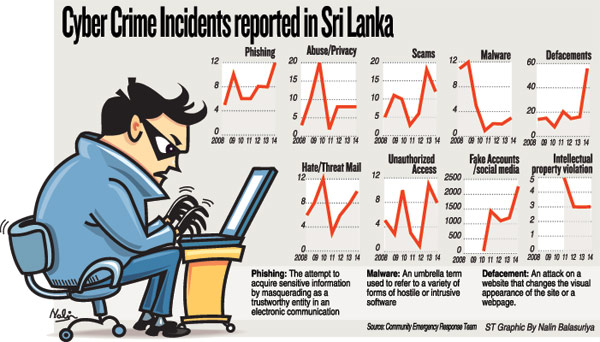News
Cybercrime rise worries authorities
Cybercrime is spiralling out of control, especially with the younger generation falling prey to hackers infiltrating social networking sites and other websites, a senior official of the Sri Lanka Computer Emergency Readiness Team (SL-CERT) warned.
So far this year, 2,250 complaints of cybercrime have been received. Most cases – around 80 per cent – relate to Facebook and primarily involved in the use of fake profiles but a sizeable number involve more serious crimes, including internet banking fraud, CERT Senior Security Engineer Roshan Chandragupta said.
Some complaints are related to hacking of passwords, stealing information, demanding ransoms and credit card fraud. “If there are any fake accounts the public can report them even if a person doesn’t have a Facebook account as Facebook has provided an option for that,” Mr. Chandragupta said.
“Having unknown persons in the Friends lists has resulted in this. Facebook users should add only friends to their Friends list,” he said.
“Cases usually involve criminals pretending to be internet banking providers in order to acquire account and password details and defraud money from people’s accounts.”
Another growing problem is reported from the internet banking sector where electronic frauds are being carried out.
“There were many people affected by masqueraders on social media,” Mr. Chandragupta said. “Some are not aware where to complain and have, therefore, not made a complaint in relation to fake profiles.”
Frauds can take place when transferring money online or paying a bill with a credit or debit card. There have been several reports of cyber criminals trying to create “phishing sites” (lookalike sites) to deceive online bank customers and steal their log-in details.
Phishing is the act of attempting to get information such as usernames, passwords and credit card details and money by impersonating as a trustworthy entity in an electronic communication, Mr. Chandragupta explained.
Criminals send emails asking people to update personal information, using URLs similar to ones owned by genuine banks, he said. Most cybercrime is committed by individuals or small groups.
The National Child Protection Authority (NCPA) has appointed a taskforce to combat the growing threat to children and young persons posed by bullying and sexual harassment through social media sites such as Facebook and Instagram, Snapchat, Viber and Whatsapp.
Some people are harassed sexually, some are threatened with the disclosure of personal information, some blackmailed and some bullied to the point of death, NCPA Chairperson Natasha Balendra said.
The taskforce has already made some arrests and intends to enforce the law very severely in these cases, she said. It will also make recommendations for new legislation to criminalise cyberbullying and cyber-harassment.
The NCPA has created a poster on online safety and the safe use of mobile phones which it intends to distribute to 7,000 schools.
It also plans to publish a booklet to be distributed to teachers and develop a trilingual website aimed at children of different age groups as well as parents, teachers, and other caregivers.
“It is important that parents and other adults also educate themselves about current technologies and are able to talk to their children about what they are doing online in a knowledgeable and non-judgmental manner and those children are able to speak to a trusted adult whenever they feel uncomfortable with anything that occurs online,” Ms. Balendra said.
“Ideally, education about online safety should form part of an overall education about personal relationships.”
| UNICEF explores IT aid UNICEF says it is increasingly exploring how IT could be used in child protection programming such as the facilitation of birth registration, rapid family tracing and case management. The organisation states that it is “engaged in advocacy for the criminalisation of child sexual abuse materials and online grooming of children; the strengthening of institutional capacities to implement legislation and policies related to investigation and prosecution of cases involving online sexual abuse/exploitation; supporting the establishment of comprehensive services for children abused/exploited through the internet and mobile phones; raising awareness and building capacities of children, teachers and caregivers on the risks of ICTs and protective measures and supporting research projects to enhance the understanding of children’s use of ICTs and appropriate responses to violence, exploitation and abuse facilitated through ICTs. |

